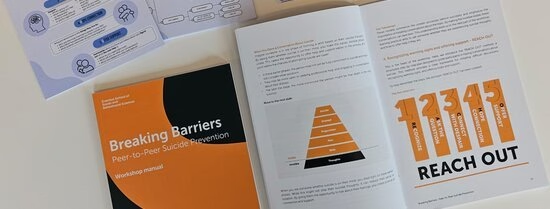Suicidal thoughts are more common among students than we think. Yet many concerns go unspoken. Students often say they want to be there for each other but don’t know how. What do you say to someone who’s clearly not doing well? Can you ask about suicide? And what if someone says: “Yes, I have considered suicide”? Many students hesitate. They fear doing the wrong thing, feel unsure of their skills, or don’t know where to refer someone for help.
That’s exactly why we developed Conversations That Save Lives: a peer-to-peer workshop that teaches students to recognize warning signs, open the conversation, and safely guide peers toward an appropriate next step. With this workshop, we increase the chance that concerns will be voiced and heard. Further down this page, you can find all workshop materials and download them to use yourself.
The workshop was developed at Erasmus University Rotterdam as part of two ZonMw-funded projects within the What Works for Youth – Research by and for Young People programme. During the pilot phase, the workshop was offered repeatedly at various faculties at Erasmus University Rotterdam and is now a permanent offer during the Student Wellbeing Week.
What does the workshop offer?
In just 90 minutes, students learn to:
- distinguish facts from myths (e.g., “asking about suicide makes it worse”);
- recognize and address warning signs of suicidality;
- use a concrete five-step structure to guide the conversation (REACH OUT);
- practice with realistic role-play scenarios.
The workshop was co-created with students with lived experience, based on scientific literature and insights from student focus groups. The approach is informed by existing knowledge and national guidelines on youth suicide prevention in the Netherlands.
The training is suitable for students from all disciplines and levels in higher education. It is facilitated by trained peers in a safe, accessible setting.
Want to use it yourself? Download all materials
All materials are freely available – for educators, student wellbeing teams, facilitators, and students who want to organize a session themselves. The manual offers all necessary guidance to implement the training safely and effectively in your own context.
If you have experience facilitating workshops or a background in the social sciences, you’ll be able to use the materials right away. All materials are written in accessible English, so they can be used in both Dutch- and English-taught programmes:
- Facilitator Manual (PDF)
- Slide Deck (PPT)
- Do’s & Don’ts Card (PDF)
- Evaluation Survey (Qualtrics of PDF)
All materials are available under an open license (CC-BY). You may download, share, and adapt them as needed, as long as you credit the original source.
Funding
This project was funded by ZonMw (Netherlands), through the programmes: What Works for Youth – Research by and for Young People (project number 07440122230012, €49,021) and Implementation Booster – What Works for Youth (project number 07440122240002, €7,500).
- More information
Would you like to implement the workshop at your university or college? Do you have questions about how it works or how to adapt it? Please get in touch:
Dr. Ruth Van der Hallen
Associate Professor of Clinical Psychology
E-mail: vanderhallen@essb.eur.nl“Are you thinking about suicide? Then contact 0800-0113 24/7 free of charge and anonymously, or chat at 113.nl.”

